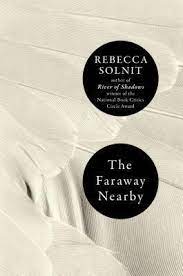
Montaigne would be proud of Rebecca Solnit’s in her 2013 collection, The Faraway Nearby.
In an essay called “Flight,” she devotes a few paragraphs to the act of writing and, as is only necessary, reading (because what’s one without the other?). I thought it was interesting. Maybe you will, too:
“Writing is saying to no one and everyone the things it is not possible to say to someone. Or rather writing is saying to the no one who may eventually be the reader those things one has no someone to whom to say them. Matters that are so subtle, so personal, so obscure, that I ordinarily can’t imagine saying them to the people to whom I’m closest. Every once in a while I try to say them aloud and find that what turns to mush in my mouth or falls short of their ears can be written down for total strangers. Said to total strangers in the silence of writing that is recuperated and heard in the solitude of reading. Is it the shared solitude of writing, is it that separately we all reside in a place deeper than society, even the society of two? Is it that the tongue fails where the fingers succeed, in telling truths so lengthy and nuanced that they are almost impossible aloud?
“I started out in silence, writing as quietly as I had read, and then eventually people read some of what I had written, and some of the readers entered my world or drew me into theirs. I started out in silence and traveled until I arrived at a voice that was heard far away—first the silent voice that can only be read, and then I was asked to speak aloud and to read aloud. When I began to read aloud, another voice, one I hardly recognized, emerged from my mouth. Maybe it was more relaxed, because writing is speaking to no one, and even when you’re reading to a crowd, you’re still in that conversation with the absent, the faraway, the not yet born, the unknown, and the long gone for whom writers write, the crowd of the absent who hover all around the desk.
“Sometime in the late nineteenth century, a poor rural English girl who would grow up to become a writer was told by a gypsy, ‘You will be loved by people you’ve never met.’ This is the odd compact with strangers who will lose themselves in your words and the partial recompense for the solitude that makes writers and writing. You have an intimacy with the faraway and distance from the near at hand. Like digging a hole to China and actually coming out the other side, the depth of that solitude of reading and then writing took me all the way through to connect with people again in an unexpected way. It was astonishing wealth for one who had once been so poor.”
You see the words “faraway” and “nearby” popping up here, how perfect they are for the lonely sharing that is writing and reading, yet the source of the title is alluded to in another essay called “Wound.” Georgia O’Keefe, the great artist who once lived in New York City, moved to the desert boonies (read: Taos, New Mexico), and when she did, she signed letters to friends with the closing “From the faraway nearby.”
Thank you, Georgia, for a theme! One which Solnit stitches like a thread through the collection is this wide-ranging book. Thank you, too, for a metaphor. One elastic enough to cover writing and reading and many other paradoxes afforded by daily life.
As for her pearls of wisdom re: writing, you can see Solnit’s point all too well if you write. As I am the nearest writer at the moment, let’s use me as an example.
Why am I writing this? I could just sip this wonderful first black coffee and passively read emails (easy) and news of the world (not-so-easy). Instead, I’m milling away at this keyboard, watching letters do the ant-crawl thing across this screen.
I’m not writing strictly for myself (though I gain from it, surely). I’m doing it for intrinsic reasons, because I’m compelled to as part of a “odd compact,” as Solnit puts it, an assumption that people I will never know are out there (in the “faraway nearby”) reading words I only recently strung together, enjoying them, relating to them.
Scary, I know. But think of it: Some may start this piece and not finish it. Some may dig all the way to the other side (the end, or what Solnit might call “China”). Some may even return to this webpage regularly to see what I write again.
Almost mystical, isn’t it? But without each other (writers, readers), the magic would be gone. The faraway wouldn’t be nearby at all.